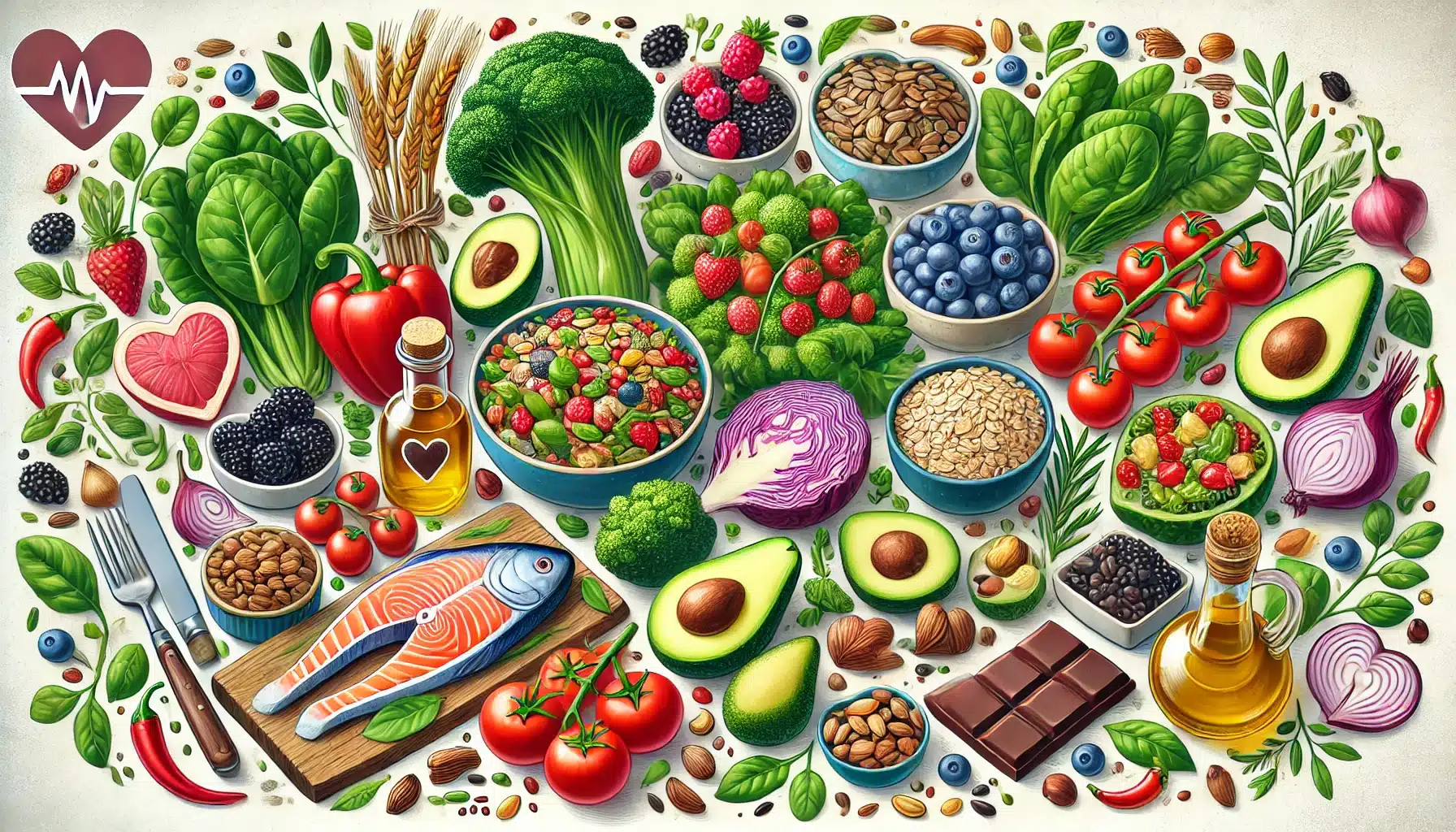Foods to Keep Your Heart Healthy Introduction
Importance of Heart Health
Heart disease is one of the leading causes of death worldwide, and maintaining a healthy heart is essential for overall well-being. A heart-healthy diet plays a crucial role in preventing cardiovascular issues, including high blood pressure, cholesterol levels, and other related conditions. By incorporating certain foods into your daily diet, you can significantly improve your heart’s health, reduce the risk of heart disease, and promote longevity.
How Diet Affects Heart Health
The foods you eat directly impact your cardiovascular system. Diets high in unhealthy fats, sugars, and processed foods can lead to clogged arteries, high cholesterol, and increased blood pressure—all risk factors for heart disease. On the other hand, a diet rich in whole foods, healthy fats, and antioxidants can help keep your heart functioning optimally. Understanding which foods to include in your diet is the first step toward a healthier heart.

Top 10 Foods for Heart Health
1. Leafy Green Vegetables
Leafy greens such as spinach, kale, and Swiss chard are packed with vitamins, minerals, and antioxidants. They are particularly high in vitamin K, which helps protect your arteries and promote proper blood clotting. Additionally, these vegetables contain nitrates, which have been shown to reduce blood pressure, decrease arterial stiffness, and improve the function of the cells lining the blood vessels.
- Benefits:
- High in dietary nitrates, which improve blood vessel health.
- Rich in fiber, vitamins, and minerals.
- How They Help the Heart:
- Helps reduce blood pressure and improve blood flow.
2. Whole Grains
Whole grains, including oats, quinoa, barley, and brown rice, are excellent sources of dietary fiber, which is known to lower LDL (bad) cholesterol and decrease the risk of heart disease. Unlike refined grains, whole grains retain all parts of the grain kernel, providing more nutrients and promoting better heart health.
- Types of Whole Grains:
- Oats, quinoa, barley, brown rice, whole wheat.
- Their Impact on Cholesterol:
- Whole grains help reduce LDL cholesterol levels, improving overall heart health.
3. Berries
Berries like strawberries, blueberries, raspberries, and blackberries are loaded with antioxidants, vitamins, and minerals that support heart health. These small fruits are particularly high in anthocyanins, a type of antioxidant that has been linked to lower blood pressure, reduced inflammation, and decreased risk of heart disease.
- Rich in Antioxidants:
- Berries contain powerful antioxidants that protect your heart.
- Studies on Heart Benefits:
- Research shows regular berry consumption can improve cholesterol levels and reduce blood pressure.
4. Avocados
Avocados are a great source of monounsaturated fats, which have been shown to lower levels of bad cholesterol and reduce the risk of heart disease. They are also rich in potassium, a nutrient essential for heart health that helps manage blood pressure by balancing sodium levels in the body.
- Healthy Fats and Heart Health:
- Avocados are packed with heart-healthy monounsaturated fats.
- Ways to Incorporate Them:
- Add to salads, smoothies, or spread on whole-grain toast.
5. Fatty Fish
Fatty fish, including salmon, mackerel, sardines, and trout, are rich in omega-3 fatty acids, which are essential for heart health. Omega-3s help reduce inflammation, lower blood pressure, decrease triglycerides, and may even reduce the risk of arrhythmias.
- Omega-3 Fatty Acids:
- Known to lower blood pressure and improve arterial function.
- Best Types of Fish:
- Salmon, mackerel, sardines, and trout are among the best choices.
6. Nuts and Seeds
Nuts and seeds are excellent sources of heart-healthy fats, protein, fiber, vitamins, and minerals. Almonds, walnuts, flaxseeds, chia seeds, and sunflower seeds are particularly beneficial for heart health due to their high levels of omega-3 fatty acids, antioxidants, and essential nutrients like magnesium and potassium. Regular consumption of nuts and seeds can help reduce LDL cholesterol, lower blood pressure, and decrease inflammation.
- Nutritional Benefits:
- Rich in healthy fats, fiber, and antioxidants that promote heart health.
- Portion Control Tips:
- A handful of nuts or a tablespoon of seeds daily is a great addition to a heart-healthy diet.
7. Olive Oil
Olive oil, particularly extra virgin olive oil, is a staple of the Mediterranean diet and is known for its heart-protective effects. It is rich in monounsaturated fats and antioxidants that help reduce inflammation, lower bad cholesterol levels, and improve blood vessel function. Replacing other fats, like butter or margarine, with olive oil can significantly boost heart health.
- Monounsaturated Fats:
- These fats help to reduce LDL cholesterol and maintain healthy arteries.
- Comparison with Other Oils:
- Olive oil is superior in promoting heart health compared to oils high in saturated fats.
8. Dark Chocolate
Dark chocolate, especially varieties with a high cocoa content (70% or higher), is rich in flavonoids, which are antioxidants that can help improve heart health. Studies have shown that moderate consumption of dark chocolate can reduce the risk of heart disease by improving blood flow, lowering blood pressure, and reducing inflammation.
- Flavonoids and Heart Benefits:
- Flavonoids in dark chocolate help relax blood vessels and improve circulation.
- Moderation is Key:
- Enjoy dark chocolate in moderation as part of a balanced diet.
9. Tomatoes
Tomatoes are packed with lycopene, a powerful antioxidant that has been linked to numerous heart health benefits. Lycopene helps reduce bad cholesterol, keep blood vessels open, and decrease the risk of heart disease. Tomatoes are also rich in potassium, another heart-friendly nutrient that aids in blood pressure regulation.
- Lycopene and Blood Pressure:
- Lycopene helps lower LDL cholesterol and supports vascular health.
- Cooking Tips:
- Cooking tomatoes can increase the availability of lycopene, making them even more beneficial for your heart.
10. Beans and Legumes
Beans and legumes, such as lentils, chickpeas, black beans, and kidney beans, are excellent sources of fiber, plant-based protein, and essential nutrients like iron and potassium. They have been shown to lower cholesterol levels, reduce blood pressure, and decrease inflammation—all contributing to better heart health.
- Fiber and Heart Health:
- High fiber content in beans helps lower cholesterol and maintain stable blood sugar levels.
- Delicious Recipes:
- Incorporate beans into soups, salads, and stews for a heart-healthy boost.

Additional Tips for a Heart-Healthy Diet
- Importance of Portion Control:
- Eating the right portions helps maintain a healthy weight, reducing strain on the heart.
- Limiting Processed Foods and Sugars:
- Reducing intake of processed foods, sugars, and unhealthy fats can further protect your heart.
Conclusion
Maintaining heart health is a lifelong commitment that begins with the choices you make at the table. By incorporating these ten foods into your diet, you can significantly reduce your risk of heart disease, improve your cardiovascular function, and enjoy a healthier life. Remember, it’s not just about what you eat but also about making consistent, balanced choices that support your heart.
Frequently Asked Questions (FAQs)
- What foods should I avoid for heart health?
- Foods high in saturated fats, trans fats, added sugars, and excessive salt should be limited to protect your heart.
- How often should I eat heart-healthy foods?
- Aim to include heart-healthy foods in every meal, balancing your diet with a variety of nutrient-rich options.
- Can supplements replace a heart-healthy diet?
- While supplements can provide additional nutrients, they cannot replace the benefits of whole foods in a heart-healthy diet.
- How do lifestyle changes complement a heart-healthy diet?
- Regular exercise, stress management, and avoiding smoking all complement a heart-healthy diet and further reduce the risk of heart disease.
- Are there any heart-healthy foods to eat in moderation?
- Foods like dark chocolate and nuts are beneficial but should be consumed in moderation due to their high calorie content.



